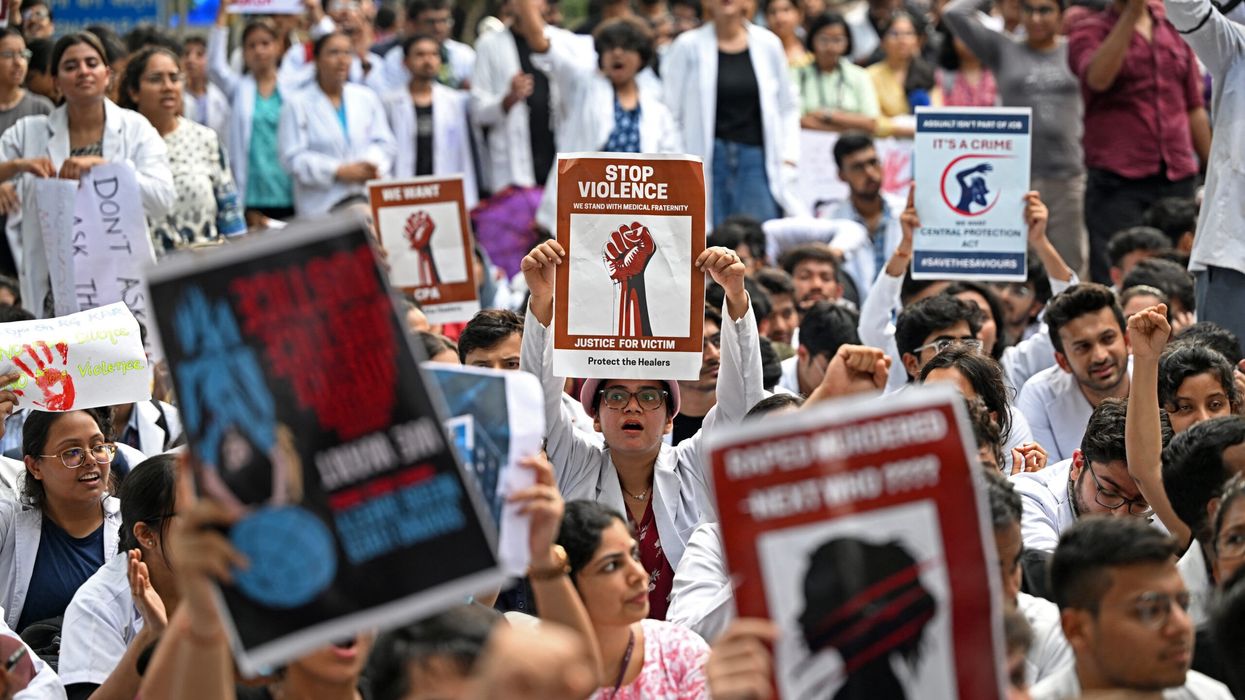INDIAN doctors initiated a nationwide strike on Saturday in response to the rape and murder of a colleague, highlighting the ongoing issue of violence against women in the country.
The incident has sparked widespread outrage, with doctors and ordinary citizens alike demanding justice.
The body of the 31-year-old doctor was discovered on August 9 at a state-run hospital in Kolkata, prompting protests in multiple cities across India. Many of these protests were led by healthcare workers, but they were also joined by tens of thousands of other citizens.
In Kolkata, thousands participated in a candle-lit vigil that continued into the early hours of Saturday morning.
Protesters held signs with messages like "Hands that heal shouldn't bleed" and "Enough is enough." In New Delhi, doctors rallied with signs demanding justice, including calls to "Hang the rapist."
The doctor was found in the seminar hall of the teaching hospital, where it is believed she went to rest during a 36-hour shift.
An autopsy confirmed that she had been sexually assaulted. The victim's parents, in a petition to the court, expressed their suspicion that their daughter had been gang-raped.
One man, an employee at the hospital who assisted with crowd control, has been detained. However, Kolkata's police have faced criticism for their handling of the case, leading the city's High Court to transfer the investigation to the Central Bureau of Investigation (CBI) to "inspire public confidence."
Medical professionals in government hospitals across several states have halted elective services indefinitely, with support from multiple medical unions.
The Indian Medical Association (IMA) escalated the protests by calling for a 24-hour "nationwide withdrawal of services" and the suspension of all non-essential procedures.
"We ask for the understanding and support of the nation in this struggle for justice for its doctors and daughters," said IMA chief RV Asokan in a statement.
The IMA described the killing as "barbaric" and called for a thorough review of the working conditions of resident doctors, citing the victim's 36-hour duty shift and the lack of safe resting spaces.
Doctors are also demanding the implementation of the Central Protection Act, a bill aimed at protecting healthcare workers from violence. "There is a lack of proper infrastructure," said Akanksha Tyagi, a resident at Lady Hardinge Medical College in New Delhi, who participated in the protests. "After working for 24-36 hours at a stretch, there's no proper place for us to rest," she added.
Indian prime minister Narendra Modi condemned the attack and called for swift punishment for those responsible.
A team from the Central Bureau of Investigation (CBI), India's premier investigative agency, is now handling the case after it was transferred from the Kolkata Police by the Calcutta High Court. Investigations have revealed that the wife of Sanjay Roy, the man accused of raping and murdering the doctor, had previously lodged a complaint at a police station, reported The Indian Express. In her complaint, she alleged that Roy had assaulted her.
India's health ministry has promised to form a committee to recommend measures for ensuring the safety of healthcare professionals. The committee will invite representatives from all stakeholders, including state governments, to contribute their suggestions, as reported by The Times of India.
Sexual violence against women remains a significant issue in India, with an average of nearly 90 rapes reported daily in 2022.
The brutal nature of this case has drawn comparisons to the 2012 gang rape and murder of a young woman on a Delhi bus, an incident that led to widespread protests and changes in the country's laws regarding sexual violence.
(With inputs from AFP)




